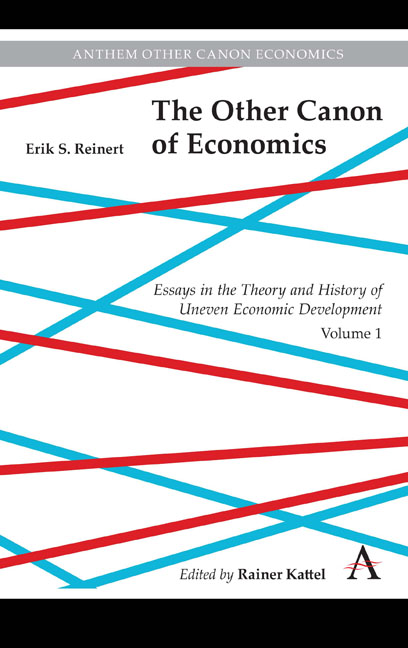Book contents
- Frontmatter
- Dedication
- Contents
- Introduction
- Chapter 1 Catching-up from Way Behind. A Third World Perspective on First World History
- Chapter 2 Recent Trends in Economic Theory — Implications for Development Geography
- Chapter 3 A Schumpeterian Theory of Underdevelopment - A Contradiction in Terms?
- Chapter 4 Competitiveness and Its Predecessors - A 500-Year Cross-national Perspective
- Chapter 5 Diminishing Returns and Economic Sustainability: The Dilemma of Resource-based Economies under a Free Trade Regime
- Chapter 6 Economics: ‘The Dismal Science’ or ‘The Never-ending Frontier of Knowledge’? On Technology, Energy and Economic Welfare
- Chapter 7 Production Capitalism vs. Financial Capitalism – Symbiosis and Parasitism. An Evolutionary Perspective and Bibliography
- Chapter 8 Globalization in the Periphery as a Morgenthau Plan: The Underdevelopment of Mongolia in the 1990s
- Chapter 9 Increasing Poverty in a Globalized World: Marshall Plans and Morgenthau Plans as Mechanisms of Polarization of World Incomes
- Chapter 10 An Early National Innovation System: The Case of Antonio Serra’s 1613 Breve Trattato
- Chapter 11 Innovation Systems of the Past: Modern Nation-States in a Historical Perspective. The Role of Innovations and of Systemic Effects in Economic Thought and Policy
- Chapter 12 The Other Canon: The History of Renaissance Economics
- Chapter 13 Benchmarking Success: The Dutch Republic (1500–1750) as Seen by Contemporary European Economists
- Chapter 14 Mercantilism and Economic Development: Schumpeterian Dynamics, Institution Building and International Benchmarking
- Chapter 15 Development and Social Goals: Balancing Aid and Development to Prevent ‘Welfare Colonialism’
Chapter 5 - Diminishing Returns and Economic Sustainability: The Dilemma of Resource-based Economies under a Free Trade Regime
Published online by Cambridge University Press: 13 April 2024
- Frontmatter
- Dedication
- Contents
- Introduction
- Chapter 1 Catching-up from Way Behind. A Third World Perspective on First World History
- Chapter 2 Recent Trends in Economic Theory — Implications for Development Geography
- Chapter 3 A Schumpeterian Theory of Underdevelopment - A Contradiction in Terms?
- Chapter 4 Competitiveness and Its Predecessors - A 500-Year Cross-national Perspective
- Chapter 5 Diminishing Returns and Economic Sustainability: The Dilemma of Resource-based Economies under a Free Trade Regime
- Chapter 6 Economics: ‘The Dismal Science’ or ‘The Never-ending Frontier of Knowledge’? On Technology, Energy and Economic Welfare
- Chapter 7 Production Capitalism vs. Financial Capitalism – Symbiosis and Parasitism. An Evolutionary Perspective and Bibliography
- Chapter 8 Globalization in the Periphery as a Morgenthau Plan: The Underdevelopment of Mongolia in the 1990s
- Chapter 9 Increasing Poverty in a Globalized World: Marshall Plans and Morgenthau Plans as Mechanisms of Polarization of World Incomes
- Chapter 10 An Early National Innovation System: The Case of Antonio Serra’s 1613 Breve Trattato
- Chapter 11 Innovation Systems of the Past: Modern Nation-States in a Historical Perspective. The Role of Innovations and of Systemic Effects in Economic Thought and Policy
- Chapter 12 The Other Canon: The History of Renaissance Economics
- Chapter 13 Benchmarking Success: The Dutch Republic (1500–1750) as Seen by Contemporary European Economists
- Chapter 14 Mercantilism and Economic Development: Schumpeterian Dynamics, Institution Building and International Benchmarking
- Chapter 15 Development and Social Goals: Balancing Aid and Development to Prevent ‘Welfare Colonialism’
Summary
‘And the land was not able to bear them, that they may dwell together …’
Genesis XIII, 6.
(quote used by Alfred Marshall, Principles of Economics, London, 1890, in order to emphasize the role of Diminishing Returns as a fundamental factor in human history.)
‘I apprehend (the elimination of Diminishing Returns) to be not only an error, but the most serious one, to be found in the whole field of political economy. The question is more important and fundamental than any other; it involves the whole subject of the causes of poverty;.. .a nd unless this matter be thoroughly understood, it is to no purpose proceeding any further in our inquiry.’
John Stuart Mill, Principles of Political Economy, 1848.
This chapter explores the impact of Diminishing Returns on world poverty and sustainable growth. Diminishing Returns is an economic factor which not only heavily influences the behaviour of costs, wages and standard of living in any resource-based economy - particularly in Third World economies - but, I shall argue, this factor is the key to understanding the concept of sustainability. This chapter argues that the strong warning from John Stuart Mill quoted above is as valid today as it was almost 150 years ago. Mill's warning has, however, been largely ignored, almost completely so in the period following World War II.
Part one of the chapter traces how Diminishing Returns disappeared from economic theory as neo-classical economics and general equilibrium analysis took over from other, less abstract, economic paradigms. Part two discusses the impact of Diminishing Returns vs increasing returns if they were to be reintroduced in international trade theory. Part three describes how ‘The Triple Curse’ of Diminishing Returns, perfect competition and price volatility combine and mutually reinforce each other in maintaining vicious circles of poverty and unsustainable growth. Part four describes how a few resource-rich nations - Australia and Canada taken as examples - managed to escape the ‘Triple Curse’ which threatens all resource-based economies. The concluding part discusses the need for a wide-ranging overhaul of the World Economic Order, an overhaul which once again incorporates the lock-in effects created by Diminishing Returns in resource-based economies.
- Type
- Chapter
- Information
- The Other Canon of EconomicsEssays in the Theory and History of Uneven Economic Development, pp. 109 - 136Publisher: Anthem PressPrint publication year: 2024

